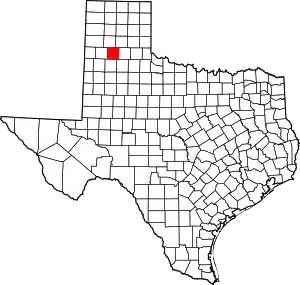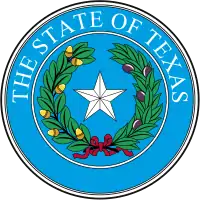Tulia, Texas
Tulia is a city in, and county seat of, Swisher County, Texas, United States.[5] The population was 4,967 at the 2010 census; in the 2018 census estimate, it had fallen to 4,682.[6] The city is at the junction of U.S. Route 87 and Texas State Highway 86, about 2 miles (3 km) east of Interstate 27. Tulia is a center for farming and agribusiness activities.
Tulia, Texas | |
|---|---|
 | |
| Motto(s): The City With A Future | |
 | |
 Tulia, Texas Location of Tulia, Texas | |
| Coordinates: 34°32′09″N 101°45′31″W | |
| Country | United States |
| State | Texas |
| County | Swisher |
| Area | |
| • Total | 3.57 sq mi (9.24 km2) |
| • Land | 3.56 sq mi (9.21 km2) |
| • Water | 0.01 sq mi (0.03 km2) |
| Elevation | 3,484 ft (1,062 m) |
| Population (2010) | |
| • Total | 4,967 |
| • Estimate (2019)[2] | 4,655 |
| • Density | 1,308.69/sq mi (505.23/km2) |
| Time zone | UTC-6 (Central (CST)) |
| • Summer (DST) | UTC-5 (CDT) |
| ZIP code | 79088 |
| Area code(s) | 806 |
| FIPS code | 48-73868[3] |
| GNIS feature ID | 1370199[4] |
| Website | www |
History
Its site was originally on the acreage of the Tule Ranch division of the JA Ranch. In 1887, a post office was established in James A. Parrish's dugout on Middle Tule Draw, 9 miles (14 km) west of what is now the site of Tulia. Evidently, the name Tule, after the nearby creek, had been selected for this post office, but at some point a clerk's error changed the name to Tulia. By 1900, Tulia was prospering as a stopping point for freight-wagon traffic en route to the railheads of Colorado City and Amarillo. A booming new era began with the extension of the Santa Fe line to Tulia in December 1906; with it came more settlers. In the mid-1980s, local industrial plants manufactured products such as clothing and farm implements, and four large cattle-feeding enterprises were nearby.[7]
1999 drug arrest scandal
Tulia gained notoriety following a drug sting in July 1999 that rounded up 46 people, 40 of whom were innocent African Americans. The remaining detainees were Whites known to have ties within the Black community, and in fact lived in the "Black" part of town. Nearly one-third of Tulia's Black males were arrested, about 15% of the town's Black population.[8][9] All charges were based on the word of undercover officer Tom Coleman, a so-called "gypsy cop" who made his living traveling through impoverished rural Texas offering to work undercover cheaply for short periods of time for underfunded police departments. Coleman claimed to have made over 100 drug buys in the small town. He never recorded any of the sales, but claimed to have written painstaking notes on his leg under his shorts and upper arm under his shirt sleeve when nobody was looking.
During the roundup, no large sums of money, illegal drugs, drug paraphernalia, nor illegal weapons were found. The accused drug dealers showed no signs of having any income associated with selling drugs. The drugs Coleman claimed to have bought from the accused did not have the fingerprints of the accused on them or their baggies. No independent witnesses could corroborate Coleman's claims. In his testimony, Coleman gave inaccurate descriptions of the "dealers" from whom he had allegedly bought cocaine. One suspect had his charges dropped when he was able to prove he had been at work during the times he had supposedly sold Coleman cocaine. Another produced bank and phone records indicating she was in Oklahoma City, Oklahoma, at the time of her alleged crime. Many of the accused, however, seeing the long sentences dealt by all-White juries in earlier cases, pled guilty in return for lighter sentences, despite their proclaimed innocence. The remaining defendants were convicted solely on the basis of Coleman's testimony. The Texas Department of Public Safety awarded "Lawman of the Year" to Coleman.[10][11]
Amarillo civil rights attorney Jeff Blackburn began investigating the Tulia defendants' cases,[12] along with civil rights organizations and a handful of attorneys from firms around the country.[13] Eventually, the case became a cause célèbre, and money was raised to legally challenge the cases. Many had already served several years in prison before this process gained momentum. By 2004, Blackburn and his team had freed most of the "Tulia 46" and a $6,000,000 collective settlement was reached to avoid further litigation in civil court. Local authorities remain defiant, promising their town will not become a "slot machine" in the face of a new lawsuit stemming from an alleged incident of police brutality during the sweep.[14][15]
In 2005, Coleman was convicted of perjury and sentenced to 10 years' probation and a $7,500 fine.[16]
Federal laws titled after Tulia have twice been introduced in the United States Congress, but not enacted, to increase the evidentiary standard required to convict a person for a drug offense and to require screening of law enforcement officers or others acting under color of law participating in drug task forces.[17]
Geography
Tulia is located at 34°32′09″N 101°45′31″W.[18] It is located 46 miles (74 km) south of Amarillo in the Texas Panhandle. According to the United States Census Bureau, the city has a total area of 3.5 square miles (9.1 km2), all of it land.
Climate
According to the Köppen climate classification system, Tulia has a semiarid climate, BSk on climate maps.[19]
Record Low
Tulia holds the record for the lowest temperature in Texas, −23 °F (−31 °C), set during the Great Blizzard of 1899. The temperature was matched by Seminole, Texas, in 1933.[20]
Demographics
| Historical population | |||
|---|---|---|---|
| Census | Pop. | %± | |
| 1910 | 1,216 | — | |
| 1920 | 1,189 | −2.2% | |
| 1930 | 2,202 | 85.2% | |
| 1940 | 2,055 | −6.7% | |
| 1950 | 3,222 | 56.8% | |
| 1960 | 4,410 | 36.9% | |
| 1970 | 5,294 | 20.0% | |
| 1980 | 5,033 | −4.9% | |
| 1990 | 4,699 | −6.6% | |
| 2000 | 5,117 | 8.9% | |
| 2010 | 4,967 | −2.9% | |
| 2019 (est.) | 4,655 | [2] | −6.3% |
| U.S. Decennial Census[21] | |||
As of the census of 2000,[3] 5,117 people, 1,698 households, and 1,222 families resided in the city. The population density was 1,447.6 inhabitants per square mile (558.9/km2). The 1,898 housing units averaged 537.0 per square mile (207.3/km2). The racial makeup of the city was 66.45% White, 8.40% African American, 0.43% Native American, 0.10% Asian, 22.14% from other races, and 2.48% from two or more races. Hispanics or Latinos of any race were 39.63% of the population.
Of the 1,698 households, 37.0% had children under the age of 18 living with them, 55.5% were married couples living together, 12.3% had a female householder with no husband present, and 28.0% were not families. About 25.8% of all households were made up of individuals, and 16.3% had someone living alone who was 65 years of age or older. The average household size was 2.64 and the average family size was 3.18.
In the city, the population was distributed as 27.8% under the age of 18, 11.9% from 18 to 24, 25.8% from 25 to 44, 18.7% from 45 to 64, and 15.8% who were 65 years of age or older. The median age was 33 years. For every 100 females, there were 113.1 males. For every 100 females age 18 and over, there were 116.7 males.
The median income for a household in the city was $27,794, and for a family was $32,415. Males had a median income of $24,857 versus $20,000 for females. The per capita income for the city was $12,956. About 16.0% of families and 19.3% of the population were below the poverty line, including 26.7% of those under age 18 and 14.9% of those age 65 or over.
Politics
Tulia is represented in the U.S. House by Republican Mac Thornberry.
Education
The city is served by the Tulia Independent School District.
Schools that serve Tulia include:
- Tulia High School (grades 9-12)
- Tulia Junior High School (grades 6-8)
- W.V. Swinburn Elementary School (grades 3-5)
- Highland Elementary School (grades EE-2)
Media
- Newspapers
- Swisher County News
In media
A documentary Tulia, Texas: Scenes from the Drug War was filmed by Sarah Kunstler and Emily Kunstler in 2003, and won the Best Documentary Short award at Woodstock Film Festival.[22][23]
Another documentary, titled Tulia, Texas, filmed by Cassandra Herman and Kelly Whalen, premiered in 2008 at the South by Southwest Film Festival in Austin and aired on PBS February 10, 2009.[24]
The Tulia 46 drug sting event was featured the film Tulia, Texas, directed by John Singleton and starring Billy Bob Thornton and Halle Berry, and was scheduled for release in 2014.[25][26] The 1999 drug arrests were also explored in the documentary American Drug War: The Last White Hope.
Rattlesnake is a 2019 crime drama mystery film set in Tulia.
Notable people
- Tim Curry, district attorney in Tarrant County, Texas, from 1972 to 2009
- The Otwell Twins
References
- "2019 U.S. Gazetteer Files". United States Census Bureau. Retrieved August 7, 2020.
- "Population and Housing Unit Estimates". United States Census Bureau. May 24, 2020. Retrieved May 27, 2020.
- "American FactFinder". United States Census Bureau. Archived from the original on February 12, 2020. Retrieved January 31, 2008.
- "US Board on Geographic Names". United States Geological Survey. October 25, 2007. Retrieved January 31, 2008.
- "Find a County". National Association of Counties. Retrieved June 7, 2011.
- Estimate. - U.S. Census Bureau. - Census.gov. - April 2005. - (Microsoft Excel *.XLS document).
- Tulia, Texas from the Handbook of Texas Online
- "The Color of Justice in Tulia Texas". Democracy Now!. Retrieved January 5, 2008.
- Nate Blakeslee (September 12, 2006). Tulia: Race, Cocaine, and Corruption in a Small Texas Town. New York: PublicAffairs. ISBN 1-58648-454-0.
- "The Color of Justice by Nate Blakeslee". The Texas Observer. Retrieved January 5, 2008.
- "Tulia Travesty Covered Up By Texas Prosecutors and Courts". Retrieved January 5, 2008.
- "Jeff Blackburn: Tulia Defender". January 13, 2003. Archived from the original on August 11, 2003. Retrieved August 23, 2010.
- Blakeslee, Nate. Tulia: Race, Cocaine, and Corruption in a Small Texas Town. New York: PublicAffairs. ISBN 1-58648-454-0.
- "Color of Justice: An Undercover Drug Bust Opens Old Wounds in Tulia, Texas". The Austin Chronicle. Retrieved January 5, 2008.
- "Color of Justice". Austin Chronicle. July 31, 2000. Retrieved January 5, 2008.
- Balko, Radley (2013). The Rise of the Warrior Cop.
- "H.R. 253: No More Tulias: Drug Law Enforcement Evidentiary Standards Improvement Act of 2007 (GovTrack.us)". Retrieved January 7, 2008.
- "US Gazetteer files: 2010, 2000, and 1990". United States Census Bureau. February 12, 2011. Retrieved April 23, 2011.
- "Climate Summary for Tulia, Texas".
- "Texas Day by Day". texasdaybyday.com. Retrieved February 10, 2018.
- "Census of Population and Housing". Census.gov. Retrieved June 4, 2015.
- Tulia, Texas: Scenes from the Drug War (2003) at IMDb
- Woodstock Film Festival 2004 Screening
- Tulia, Texas (2008) at IMDb
- Tulia (2014) at IMDb
- "Tulia (2008) - Movie Details - Cast & Crew, Photos & Trailer". The Movie Insider. Retrieved January 7, 2008.
External links
- City of Tulia
- Tulia, Texas from the Handbook of Texas Online
- Search the Tulia Herald from 1918-1956
- Tulia Independent School District
- Tulia, Texas (Video). PBS Independent Lens. Retrieved February 16, 2015.
- Tulia, Texas at IMDb (Documentary)

